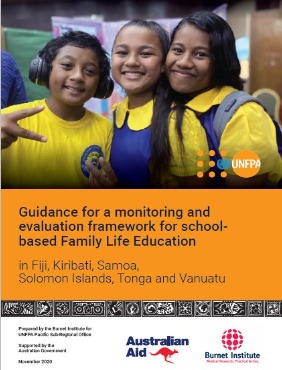Family life education (FLE) is a curriculum-based process of teaching and learning about the cognitive, emotional, physical and social aspects of sexuality and family formation. A well designed and implemented FLE program can prepare children and young people for healthy and responsible relationships throughout their lives. FLE also supports young people to develop good health, and safeguard their own and others’ sexual and reproductive health and rights.
There is increased attention and investment in FLE from national governments globally and in the Pacific region. Embedding a comprehensive monitoring and evaluation framework in a national FLE program supports the program to achieve maximum impact by tracking implementation quality and school-level outcomes, and assists policymakers and school leaders to tailor the program to evolving population health needs and other national priorities.
This guidance for a monitoring and evaluation framework for school based family life education (FLE) was commissioned by the United Nations Population Fund (UNFPA) and undertaken by the Burnet Institute under the Australian Government funded Transformative Agenda for Women, Adolescents and Youth in the Pacific programme. The content in this guidance is presented and shared as a basis for future collaborative discussion and adaptation with Ministries of Education representatives and other national stakeholders, to support the development of locally contextualised national monitoring and evaluation frameworks for FLE for the six programme countries.



